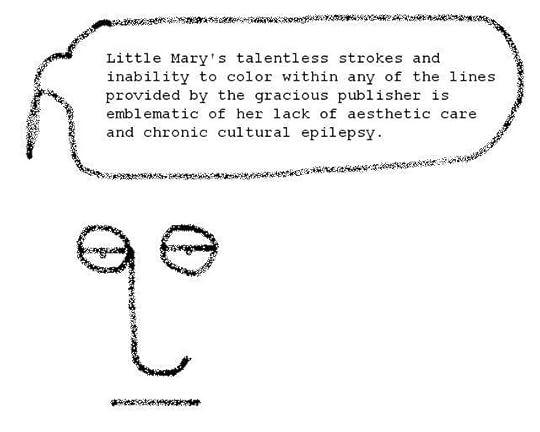The Duties of an Author and the Responsibilities of a Reader
 There are aspects of the rise of online booksellers, e-books, reader-reviews and the general phenomena surrounding reading and the internet that I like very much. But there are also parts of it I abhor. Self-publishing, the rise of small e-book presses and the refusal of publishers to do the marketing they once did has meant that much of the promotion of a new book falls onto the writer. Personally, I find it deeply embarrassing. My job as I see it is to write as well as I can and inform potential readers of my books’ availability – in moderation! That’s it. There are writers who put a lot more effort into self-promotion; I respect them for their energy, but I just can’t do it. However, when writers get rude and pushy and demand not only reviews, but GOOD reviews, I draw the line. That’s beyond the pale.
There are aspects of the rise of online booksellers, e-books, reader-reviews and the general phenomena surrounding reading and the internet that I like very much. But there are also parts of it I abhor. Self-publishing, the rise of small e-book presses and the refusal of publishers to do the marketing they once did has meant that much of the promotion of a new book falls onto the writer. Personally, I find it deeply embarrassing. My job as I see it is to write as well as I can and inform potential readers of my books’ availability – in moderation! That’s it. There are writers who put a lot more effort into self-promotion; I respect them for their energy, but I just can’t do it. However, when writers get rude and pushy and demand not only reviews, but GOOD reviews, I draw the line. That’s beyond the pale.
I just read a rather disturbing blog post over at The Masquerade Crew, by @DianthaJones on some of the staggering harassment she’s had from writers: How not to piss off a book blogger.
To writers:
I commiserate with writers. If you’ve spent the better part of six months to a year carefully crafting a novel, lovingly bringing the story and characters to life, then it can seem very disappointing when your acclaim, sales and reviews don’t seem to reflect that effort. But I would like to be clear: just because you want to be a writer doesn’t mean anyone owes you anything. You don’t have a right to earn a living at it just because you think you deserve it. And if this isn’t tolerable to you, there are many other jobs and endeavors that are more likely to reward your efforts. You should find another. Either write because you love it and you feel a sense of accomplishment from doing it, or don’t do it at all.
You also don’t have the right to keep pushing your book down everyone’s throats on every social media platform available. Yes, please inform us when you publish something new. And please offer us some insight to your work and your craft. But for god’s sake, it has gotten to the point where I am loathe to follow writers on Twitter for fear my timeline will become nothing but a stream of ads of ‘buy my book’.
I’ve never requested a review and I won’t give a book away for free to get one. I know this is common practice, but it offends me to do it. If someone has paid for my book and then reviews it, I feel it is a supreme compliment, whether the review is good or bad. They’ve paid their money, read the thing, and have every right to have an opinion on it and to express that opinion – but not the obligation to do so. And, good or bad, a review means that a reader has gone above and beyond the call in not only spending the time to read the book, but the additional time and thought to give it a review.
Yes, I agree that the rise of the reader-reviewed sites and sales outlets has meant that the landscape of critical literary response has changed dramatically. Readers, as opposed to critics, have been empowered to have their opinions heard like never before. And yes, they don’t feel the same obligation to give anything but a gut-level response. Some reviews I’ve read are poorly constructed, unthoughtful and sometimes – I have heard through the rumour mill – strategically vicious. This is the price we pay for the rise of these technologies. But, keep in mind, prior to this, a writer had to cross her fingers and blindly hope that some professional critic would bother to peruse the book and give it some response. Most writers published into silence and the only feedback they ever got was a sales sheet at the end of the year. Things aren’t perfect now, but they’re better.
However, the bottom line is: if you can’t take a bad review, don’t publish your book. Period.
To readers:
As I said before, readers now have a power to express their opinions, promote books they’ve enjoyed and criticize books they didn’t enjoy in a way that, even a decade ago, was unimagined. However, your public outlet comes with some responsibility. Whether your review is positive or negative, once you decide to air your opinion publicly, you do have an ethical obligation to give reasons for your opinion. Otherwise, it informs no one; it’s just an unthinking exhibition of your delight or your disgust. It doesn’t add to the debate and it turns the reader-review landscape into a mud-bath of unreasoned reactions.
Also, if you’re reviewing outside your favourite genre, then be big enough to admit it. Say you don’t usually read (insert genre here) and so your reaction is not one moderated by any great knowledge of other books within the genre. Well-considered reviews are contextual, so if you don’t have context, be kind enough to fess up. Your honesty adds legitimacy to what you say next.
To readers and writers:
We need to be respectful of the fact that we are all walking an unfamiliar path. Our ability to communicate with each other over published works has never been like this before. Readers want to read good books and enjoy them. Writers want to write good books and have them read. There are limits to what we can expect from each other.
No reader has the right to expect to read a work of considerable length for free, but they do have the right to expect a fair level of craft on the part of the writer. No writer has the right to expect that all readers are going to love their books, and they need to understand that for every person who loves it, there are probably an equal number of readers who didn’t. Anything else is delusional.
Play nice, people. We need each other.





